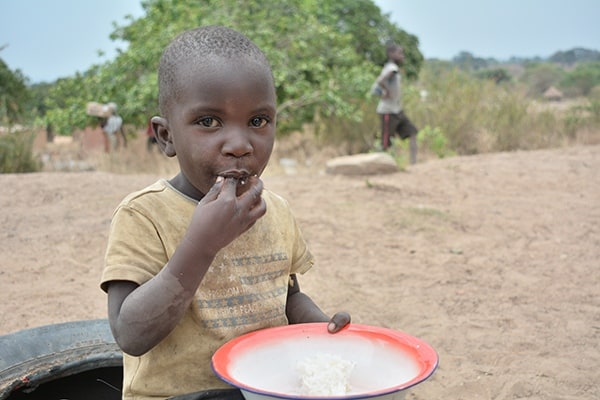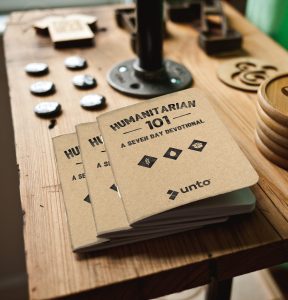Help Stop Hunger Worldwide
By Amanda DeWitt

The world faces a global hunger crisis unlike anything we have ever seen. Hunger was already on the rise, and now as many as 270 million people may soon struggle to have enough to eat.
Food is one of our most basic needs. Experts estimate that a healthy person can survive one to two months without food. With today’s technology and innovation, why are so many people still dying from starvation?
The problem of food security is complex. Globally, farmers produce enough food to feed everyone on the planet and more. But as you might imagine, solving the hunger issue is not as easy as just distributing food. Shipping and supply chain issues, drought and environmental factors, war and conflict all affect food security for millions of people worldwide. Farming practices, food waste management, and production issues also play a role.
So how do we fix the problem?
It takes each of us working together and doing our part. At Unto® we help you address the hunger problem through our Food and Agricultural Program, which takes a two-part approach to meeting the needs of hungry people in the toughest places.
Meals and Seeds
Where food shortages persist, Unto helps stop hunger by giving families lifesaving meals. For farmers in Africa meals help fill the gaps during times of the year when their production is low — ensuring their families stay fed. For school children and orphans, meals help them stay in school, providing the nutrition they need to learn, thrive, and build a better future. For refugees meals provide lifesaving nourishment for them and their children.
For a sustainable food and income source, Unto also provides vegetable seeds that can be harvested for subsequent crops. This allows families to grow their own food and then sell the extra to help provide for their basic needs. By supplying seeds we help families become self-sustaining and ensure they have nourishment on an ongoing basis.
Agriculture Technology
The hunger problem requires both short and long-term solutions. So in addition to meals and seeds, Unto works with communities to develop gardens and train people to use bucket drip-irrigation kits for a more conducive environment to producing long-term food solutions. Our staff members and partners strategically work with people in specific communities to ensure their nutritional needs are met.
Recently a group of pastors completed an Unto agricultural training and received seeds to plant a garden. This allows them to provide for their families and for the needs of their church members and community. It also allows them to sell extra produce at the market so they can use the income to meet basic needs and invest back into their communities.
Schools also benefit from this program. Onsite gardens at local schools provide food for the school children, teachers, and the community. When children are a part of planting and keeping a community garden, they learn valuable farming practices that prepare them for life. The agricultural training they receive equips them to one day provide for themselves and their own families.
Hope for Today and Tomorrow
When you provide meals, seeds, or agricultural training for someone, you are giving them hope for today — and for a brighter tomorrow. But your gift does something even more.
Food and agricultural training are one way our local partners serve their communities — gaining access to new people groups, credibility with government officials, and increased effectiveness in ministry. As they meet tangible needs, relationships form. And at the right time, they have the opportunity to share about the eternal hope of Jesus.
This holistic approach to the hunger problem allows us to serve the whole person — to meet both their physical and spiritual needs. It provides food that strengthens frail bodies, soothes hungry stomachs, and introduces people to the One who satisfies starving souls.
How will you help end global hunger today?
Want to learn more about being a humanitarian?
People around the world experience suffering, and we wonder how to help change that. But the Bible assures us that God is constantly at work, drawing people to Himself, not in spite of disaster, conflict, and poverty, but even in and through those situations. Our Humanitarian 101: A 7-Day Devotional journal offers seven devotionals designed to help you consider suffering and how you can make a difference.

Published November 2, 2020

Amanda is a freelance writer whose work has appeared in Gift for Leadership, Kindred Spirit, and Christianity Today publications. She holds a M.A. in Media and Communication from Dallas Theological Seminary.





